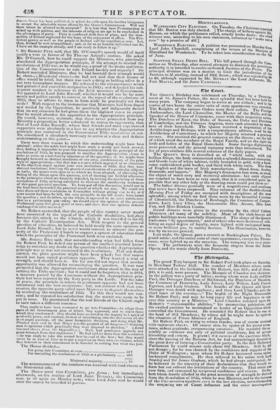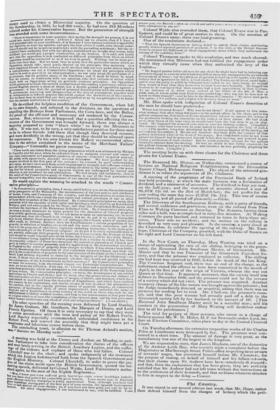trbe iftetropoIti.
The grand Tory banquet to Sir Robert Peel took place on Saturday, Sir Robert Peel, on rising to return thanks, was of course received with rapturous chet rs. Of course also, he spoke of' his proud sensa- tions, ardent gratitude, overpowering emotions. Ile regarded the tic sembly as evidence not only of political confidence, but of private friendship and esteem. It proved tl e success of the exertions which, since the passing of the Reform Act, he had unremittingly devoted to the great duty of forming a Conservative party. In the first Reformed
Parliament he could muster only about 100 Members. Still he did
not despair ; for lie was cheered by the confidence and support of the Duke of lVellington ; upon whom Sir Robert bestowed some rather
hackneyed compliments. He then referred to his union with Lord
Stanley and Sir James Graham, which he had always anticipated; foe he believed in the sincerity of their declarations that they would re- form but not subvert the institutions of the country. That union wad now firm, and cemented by reciprocal confidence and esteem. Salto: bert triumohantly alluded to the great accession of strength he dented
from the dissolution of 1835 increase of when he was Minister, and to the
of the Conservative numbers even in the last election, notwithstanding the unsparing use of Court influence and the other unscrupulous mew used to obtain a Ministerial majority. On the question of the Speakership, in 1833, he had 306 votes ; he had now 313 Members n listed under his Conservative banner. But the possession of strength isva s attended with some inconvenience— There Is impatience in some quarters, that seeing the strength we possess. it is not 01101 into more frequent action. (Cheers) Allow me to observe, that if I have a „wgrounded title to your confidence, it is because I have always ventured respectfully but implicitly to state my opinion, and give the best advice I could, even though some- times not be in precise conformity with the prevailing sentiment ; bat the re- c„.ptto' n it t have uniformly met with has always emboldened me to take that course, fully oddent you would put a proper construction on my motives. It is said, and justly c90id-, that the opposition is now conducted on different principles from those on which opposition would be conducted to us if we were in power. Nothing can be more per- fectly true than that. But we must hear in mind, that the particular course which an ssosi • should Mite, must partly depend on the principles they maintain. Our e343"-imlipa°ntisent friends in the country must recollect that our very name almost implies 1:n11dr/diction—we are a Conservative Opposition ; we adopt the principles which 6,7 to be said to prevail in an administration ; we not only adopt the principles of a government, but we perform many of its functions; end it must he borne in mind, that we cannot, in conformity with our opinions, take that latitude of action which might befit an Opposition acting on precisely contrary principles. An Opposition which professed to think the ancient institutions of this country a grievance, which eon- sidered English society a MASS of abuse, has a double ground of apposition against a gow °meat: it has, first, the ground of personal dissatisfaction with the course taken by government, censuring and dieapproving; of the acts of government, together with ao iudisposition to inflame popular discontent against the institutions of the country. But we must bear in mind that our duty prescribed to us by our principles is to main- tain the ancient institutions of this country. He described the helpless condition of the Government, when left to its own friends, and referred to the divisions on the questions of expelling the Bishops from Parliament, the Corn-laws, and the Ballot, for proof of the efficient and necessary aid rendered by the Conser- vatives. But, whenever it happened that a question affecting the ex- istence of the Government was brought forward, there was always a majority prepared to vote " black white " to keep the Ministers in office. It was not, to be sure, a very satisfactory position for those men to be in whose friends told them that though they deserved censure, and were decidedly in the wrong, yet that they should be allowed space for repentance. To his own friends Sir Robert recommended atten- tion to the advice contained in the motto of the Merchant Tailors' Company—" Concorditt res perm crescent "- "Theis words are taken from the dying admonition which was addressed by Micipsa to lugurtha and his sous, when he exhorted them to maintain concord and union as one main instrument and essential condition of success—Concorditi res perry crescent. He added, with equal truth, discordb: +nazi ena• delableatur. We have prolited by the Melia involved in the first part of the sentence; by concord, by good understanding and union, we have increased from small beginnings to strength and infitierice a hitch is Bee all bat predominant. The solemn warning iuvolved in the latter part—the warn- ing that the utmost prosperity and apparent success are endangered by discord and disunion, is out necessary for our admonition. We feel deeply and intimately, that in the union of the Conservative party of this country is one of the best guarantees for Internal tranquillity and the maintenance of our ancient institutions."
He would explain the meaning he attached to the words " Conser- vative principles-
" By Conservative principles, then, I mean, and I believe you mean, the maintenance of the prerogative of the Monarchy, the maintenance of the just powers and attributes of Queen, horde, and Commons or the country, and the determination to resist every encroachment which can curtail the just rights and settled privileges of one or other of those three branches of the Constitution. By Conservative principles we mean, that coexistent with the equality of civil rights and privileges, there shall be an Established Religion, paid and encouraged by the State. and that this Established Religion shall maintain the doctrines of the Protestant Reformed faith. Ely Conservative principles, we mean a steady resistance to every project for the alienation of Church property from strictly spiritual purposes. We tio not mean to raise an unnecessary cry, to serve a political end, that the Church is in danger; but we do put it to every reasonable man to say whether those proposals do trot endanger the C Much, which if carried into effect sou', in Ireland, alienate from the Establishment a certain proportion of her property. ia violation of biuding compacts and the most solemn assurance.. auti de. vote it to the purposes of education, expressly excluding instruction in the main prin. ciples and precepts of the Protestaut religion; we do pot it to every reasonable man to say abetter, although their property be improved, if concernedly the Bishops in Eng. land should be made stipendiaries of the State, the Chinch could be free from danger, Its own revenues being applied to relieve property from a louden to %stitch it has been immemorially subject—if those two measures, the unlimited alienation of Church pro- peny in Ireland to secular purposes, and the application of the ecclesiastical revenues in England to the relief of property from charges to which it has always been liable, thereby threatening the dissolution of that connexion between Church and State int plied in the contribution of property to the maintenance of the fabric of the Church. and which Load hitherp regarded as essential to the integrity of the Establishment—we do ask, if those two measures were passed, a hether they would not greatly endanger the maintenance of the Establishment in both countries? fly Conservative principles, we mean the rescuing from threatened danger our Protestant Establishments. Nay more, we mean the infliction, if we can, of ' a heavy blow and a great disconragement ' SPOS those principles which are antagonist to the establishment of the Protestant faith in these realms. By Conservative principles, we mean the meintetiance of our settled ingitutions in Monett and State ; and we mean also the preservation and defence of that combination of law, of institut ions, of usages, of habits, and manners, which have
contributed to mould and form the character of Englishmen, and which have enabled this country in the contentions and fearful rivalry of war to totted the admiration of her enemies, and in the equally glorious career of peaceful industry, of commercial enterprise, of mechatilcal skill, of social improvement, have endeared the name of Englund and of Englishmen in every country of the world to those who seek for the establishment of liberty without licence, and look to the maintenance of that pure form of religion which is at once the consolation of the virtuous man. and the best guarantee which human institutious can afford of civil and religious liberty." (Loud cheers.)
The other speeches of the evening were delivered by Lord Stanley, Sit James Graham, Mr. Goulburn, the Marquis of Douro, and Lord Francis Egerton, Of them it is only necessary to say that they were in entire accordance with the tone and policy of Sir Robert Peel's. Lord Stanley especially recommended unbounded confidence in Sir Robert Peel, and warned the assembly that they might have yet a 'wearisome and laborious course before them.
The concluding toast, in allusion to Sir Thomas Acland's motion, was" Success on Monday next."



























 Previous page
Previous page